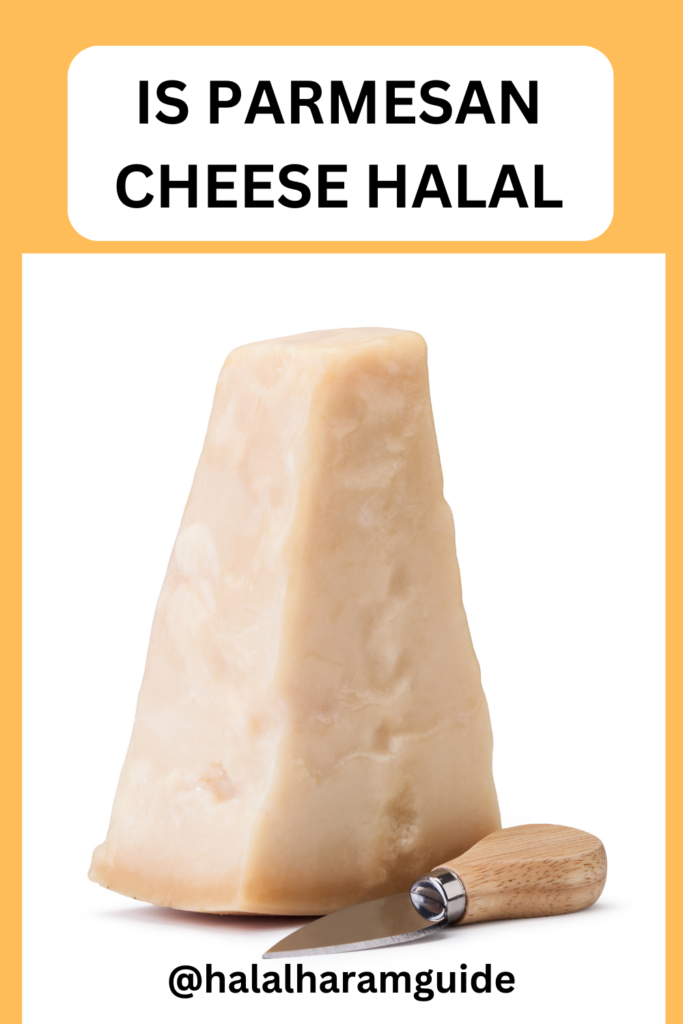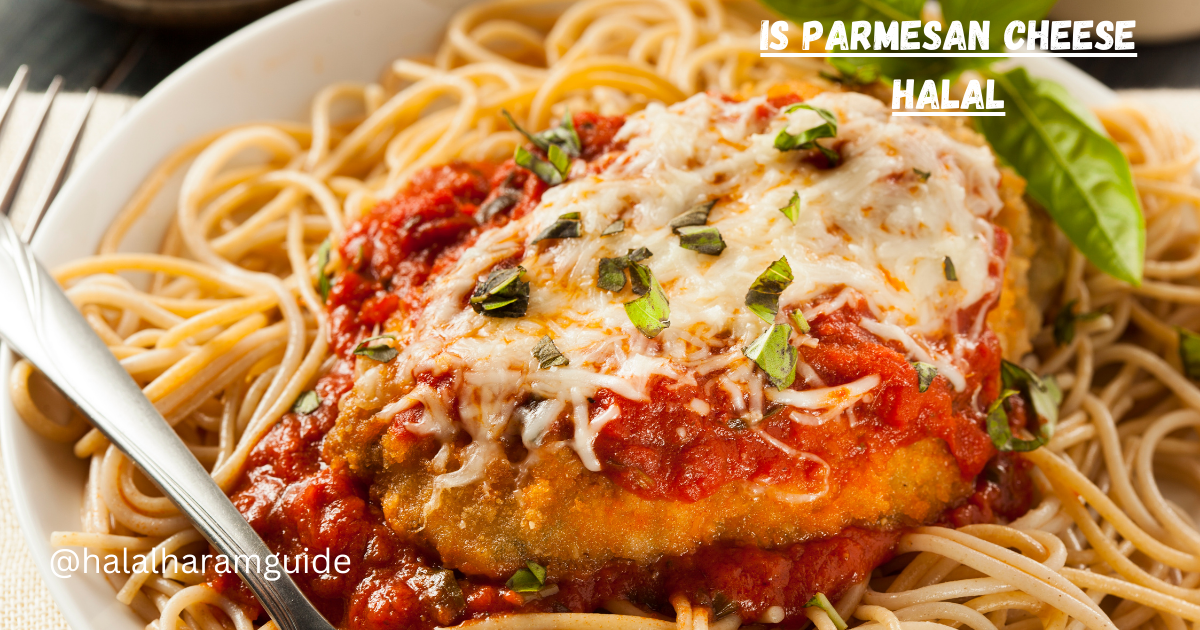Let’s talk about,“Is Parmesan Cheese Halal?”
Cheese is a culinary delight cherished by people around the world, finding its way into countless dishes and snacks. However, for Muslim consumers, the world of cheese can be a bit complex when it comes to adhering to Halal dietary guidelines.
Among the many cheese varieties, Parmesan cheese has a unique flavor profile that enhances a range of dishes. But the question that often arises is, “Is Parmesan cheese Halal?” In this exploration, we dive into the world of cheese to uncover the intricate details that determine whether Parmesan cheese can be included in a Halal diet.
We’ll examine the ingredients, production methods, and considerations that influence the Halal status of this beloved cheese, providing clarity for those seeking to enjoy its savory goodness while staying true to their dietary principles.
Is Parmesan Cheese Halal Or Haram?
Parmesan cheese, like many other types of cheese, can be a subject of debate among Muslims regarding its Halal (permissible) or Haram (forbidden) status. The Halal status of Parmesan cheese depends on several factors:
Ingredients: The primary concern with Parmesan cheese is the source of rennet used in its production. Rennet is an enzyme traditionally obtained from the stomach lining of young calves and is used to coagulate milk in the cheese-making process.
Type of Rennet:
Animal Rennet: If Parmesan cheese is made using animal rennet derived from non-Halal animals, it is generally considered Haram because the source is Haram.
Microbial or Plant-Based Rennet: Some modern cheese producers use microbial or plant-based rennet, which is Halal, to coagulate milk. Cheese made with such rennet is considered Halal.
Halal Certification: Some Parmesan cheese products may have Halal certification, indicating that they have been produced using Halal ingredients and processes. Checking for Halal certification on the packaging can provide assurance to consumers.
Given these considerations, Muslims who are strict in adhering to Halal dietary guidelines may prefer to look for Parmesan cheese that is explicitly labeled as “vegetarian” or “made with microbial rennet” to ensure that it is Halal. Additionally, Halal certification can provide further assurance.
Use Of Parmesan Cheese
Parmesan cheese is a versatile and flavorful cheese that adds a savory, nutty, and salty taste to various dishes. It is widely used in cooking, particularly in Italian cuisine, but its delicious flavor can complement a range of dishes from different culinary traditions. Here are some common uses of Parmesan cheese:
Grated Parmesan Cheese: Grated Parmesan cheese is a popular topping for pasta dishes. It is often sprinkled over spaghetti, fettuccine, or lasagna to enhance their flavors.
Pizza Topping: Parmesan cheese can be used as a pizza topping along with mozzarella and other cheeses. It adds a rich and distinct taste to pizza.
Salads: Shaved or grated Parmesan cheese can be added to salads to provide a salty and savory element. Caesar salad, for example, traditionally includes Parmesan cheese.
Soups and Risottos: Parmesan cheese is a key ingredient in creamy soups and risottos. It helps create a smooth and velvety texture while adding depth of flavor.
Sandwiches: Some sandwiches benefit from the addition of Parmesan cheese. It can be used as a filling or a topping to add an extra layer of flavor.
Omelets and Scrambled Eggs: A sprinkle of grated Parmesan cheese in omelets or scrambled eggs can elevate their taste.
Bread and Crackers: Parmesan cheese can be incorporated into bread or cracker recipes to create savory baked goods with a cheesy twist.
Vegetables: Parmesan cheese pairs well with roasted or sautéed vegetables. You can sprinkle it over broccoli, asparagus, or Brussels sprouts for added flavor.
Pesto Sauce: Parmesan cheese is a key ingredient in traditional pesto sauce recipes. It combines with basil, pine nuts, olive oil, and garlic to create a flavorful sauce for pasta.
Snacking: Parmesan cheese can be enjoyed on its own as a snack. You can find Parmesan cheese crisps or Parmesan bites in some markets.
Casseroles: Parmesan cheese can be included in various casserole dishes, such as baked ziti or eggplant Parmesan, to provide a cheesy layer and enhance the overall taste.
Grilled Meats and Seafood: Grated or shaved Parmesan cheese can be used as a finishing touch for grilled meats, fish, or seafood.
Ingredients Explained With Halal And Haram Status
Ingredients used in food products can vary widely, and their Halal (permissible) or Haram (forbidden) status can depend on their source, processing, and any additives or flavorings used. Here are explanations of some common ingredients along with their general Halal or Haram status:
Halal Ingredients:
Gelatin:
Halal Status: Gelatin derived from Halal sources, such as cattle or fish, is considered Halal.
Lard (Pork Fat):
Halal Status: Lard derived from Halal-slaughtered animals is not considered Halal.
Alcohol (Ethyl Alcohol):
Halal Status: Consuming pure ethyl alcohol is Haram as it is intoxicating. In food products, it depends on the source and whether it undergoes transformation into a non-intoxicating form during processing. Some flavorings and extracts may contain alcohol and require verification.
Vanilla Extract:
Halal Status: Vanilla extract containing alcohol from Halal sources is generally considered Halal. Some Halal-certified extracts are available.
Emulsifiers (e.g., Mono- and Diglycerides):
Halal Status: Emulsifiers derived from Halal sources are considered Halal.
Lecithin:
Halal Status: Lecithin derived from plants or Halal sources is considered Halal.
Pectin:
Halal Status: Pectin is generally considered Halal when derived from plant sources.
Natural Flavors:
Halal Status: Halal certification or knowing the source is essential. Natural flavors can be Halal if sourced from Halal ingredients.
Artificial Flavors:
Halal Status: Artificial flavors are generally Halal unless they contain Haram ingredients.
Colorings (e.g., Carmine):
Halal Status: Some colorings are Halal, but it depends on the source and processing. Carmine, derived from insects, is considered Haram by some scholars.
Haram Ingredients:
Gelatin:
Haram Status: Gelatin derived from non-Halal sources, such as pork, is considered Haram.
Lard (Pork Fat):
Haram Status: Lard from pork is Haram.
Alcohol (Ethyl Alcohol):
Haram Status: Pure ethyl alcohol is Haram.
Vanilla Extract:
Haram Status: Vanilla extract containing Haram (e.g., pork-derived) alcohol is Haram.
Emulsifiers (e.g., Mono- and Diglycerides):
Haram Status: Emulsifiers derived from Haram sources are Haram. It’s important to know the source and processing methods.
Lecithin:
Haram Status: Lecithin derived from non-Halal sources, such as pork, is Haram.
Pectin:
Haram Status: Pectin derived from Haram sources would be Haram.
Natural Flavors:
Haram Status: Natural flavors containing Haram ingredients, such as alcohol, are Haram.
Artificial Flavors:
Haram Status: Artificial flavors containing Haram ingredients, such as alcohol, are Haram.
Colorings (e.g., Carmine):
Haram Status: Colorings containing Haram ingredients or questionable sources may be Haram.
How To Make Parmesan Cheese?
Making Parmesan cheese, also known as Parmigiano-Reggiano, is a complex and time-consuming process that requires specialized equipment and specific conditions. It’s traditionally produced in Italy, primarily in the regions of Parma, Reggio Emilia, Modena, and parts of Bologna and Mantua. Here’s a simplified overview of the cheese-making process:
Ingredients:
Fresh cow’s milk (usually whole milk)
Rennet (an enzyme to coagulate the milk)
Cheese culture or starter culture
Cheese salt
Equipment:
Large stainless steel pot
Cheese molds
Cheese press
Cheese cloth
Cheese aging cellar or room
Steps:
Milk Collection
Addition of Starter Culture
Rennet Addition
Cutting and Cooking
Molding
Salting
Aging
Quality Control
Labeling
Some Halal And Vegan-friendly Brands
Gardein:
Gardein offers a variety of plant-based meat alternatives that are both vegan and Halal-certified. Their products include meatless burgers, chicken tenders, meatballs, and more.
Beyond Meat:
Beyond Meat produces plant-based meat substitutes, including the famous Beyond Burger and Beyond Sausage. Many of their products are vegan and can be considered Halal, but it’s essential to check for Halal certification on specific items.
Tofurky:
Tofurky specializes in vegan meat alternatives, including deli slices, sausages, and roasts. Many of their products are suitable for both vegan and Halal diets.
Amy’s Kitchen:
Amy’s Kitchen offers a variety of frozen and canned vegan and vegetarian products, including soups, chili, and frozen meals. Many of their products are vegan and do not contain Halal-restricted ingredients.
MorningStar Farms:
MorningStar Farms produces a range of vegetarian and vegan products, including veggie burgers, nuggets, and breakfast items. While some of their products are vegan, it’s important to check for Halal certification.
Parma Vegan Parmesan Cheese
Parma Vegan Parmesan Cheese is a plant-based Parmesan cheese alternative made primarily from nutritional yeast, nuts (such as almonds or cashews), seeds, and spices.
It is dairy-free, lactose-free, and free from animal products, making it suitable for vegans and those with lactose intolerance.
Parma Vegan Parmesan Cheese is often used as a topping for pasta dishes, salads, pizzas, and various other foods where traditional Parmesan cheese would be used.
It provides a savory, cheesy flavor and can add a delightful umami quality to dishes.
GO Veggie Vegan Parmesan Cheese
GO Veggie Vegan Parmesan Cheese is another vegan-friendly Parmesan cheese substitute that is dairy-free and plant-based.
This product is typically made from a combination of ingredients such as water, soy protein concentrate, canola oil, and various seasonings to mimic the flavor of Parmesan cheese.
GO Veggie Vegan Parmesan Cheese is versatile and can be sprinkled on pasta, salads, soups, and other dishes for added flavor.
It is often used by individuals who follow vegan diets or have dairy allergies.
Conclusion
In conclusion, the Halal status of Parmesan cheese can be complex and depends on various factors, primarily the source of rennet used in its production. While some Parmesan cheeses are made with microbial or plant-based rennet and are generally considered Halal, others may use animal rennet, which may or may not be Halal depending on how it was sourced and processed.
To ensure that Parmesan cheese aligns with Halal dietary preferences, individuals should look for Halal-certified options or those explicitly labeled as using plant-based or microbial rennet. Additionally, consulting with knowledgeable religious authorities or scholars can provide further guidance on the permissibility of specific Parmesan cheese products in accordance with one’s faith.
FAQ’S
Is there halal Parmesan cheese?
Yes, there are Halal-certified Parmesan cheese options available. These are produced using Halal-compliant ingredients and processes. Look for Parmesan cheese products that have received Halal certification from reputable Halal certifying authorities. It’s important to verify the certification to ensure it aligns with your Halal dietary preferences.
Is there alcohol in Parmesan cheese?
Parmesan cheese itself does not typically contain alcohol. However, in some cases, certain Parmesan-flavored products, such as dressings or sauces, may include flavorings or extracts that contain alcohol. To be certain, always check the ingredient list of the specific product you are using.
Does all Parmesan have pork?
Traditional Parmesan cheese does not contain pork or pork by-products. The primary concern for Muslims regarding Parmesan cheese is the source of rennet used in its production. Rennet is an enzyme traditionally obtained from the stomach lining of young calves. The Halal status of Parmesan cheese can vary based on the source of rennet and production methods. Some Parmesan cheeses may use microbial or plant-based rennet, while others may use animal rennet.
Can Muslims eat rennet?
The permissibility of consuming products containing rennet varies among Islamic scholars and schools of thought. Some scholars consider cheese made with animal rennet as Halal if the animal was slaughtered according to Islamic principles. Others may be more cautious and recommend avoiding it. It’s advisable for individuals to consult with knowledgeable religious authorities or scholars who can provide guidance based on their personal beliefs and dietary restrictions.
- “Is Lobster Halal? Understanding Its Permissibility”
- “Is Drawing Haram in Islam? Understanding the Perspective”
- “Is Fermented Kimchi Halal? Exploring Kimchi’s Halal Status”
- “Is Collagen Halal? Unveiling the Halal Status of Collagen”
- “Is Wine Vinegar Halal? Unveiling Its Permissibility”


